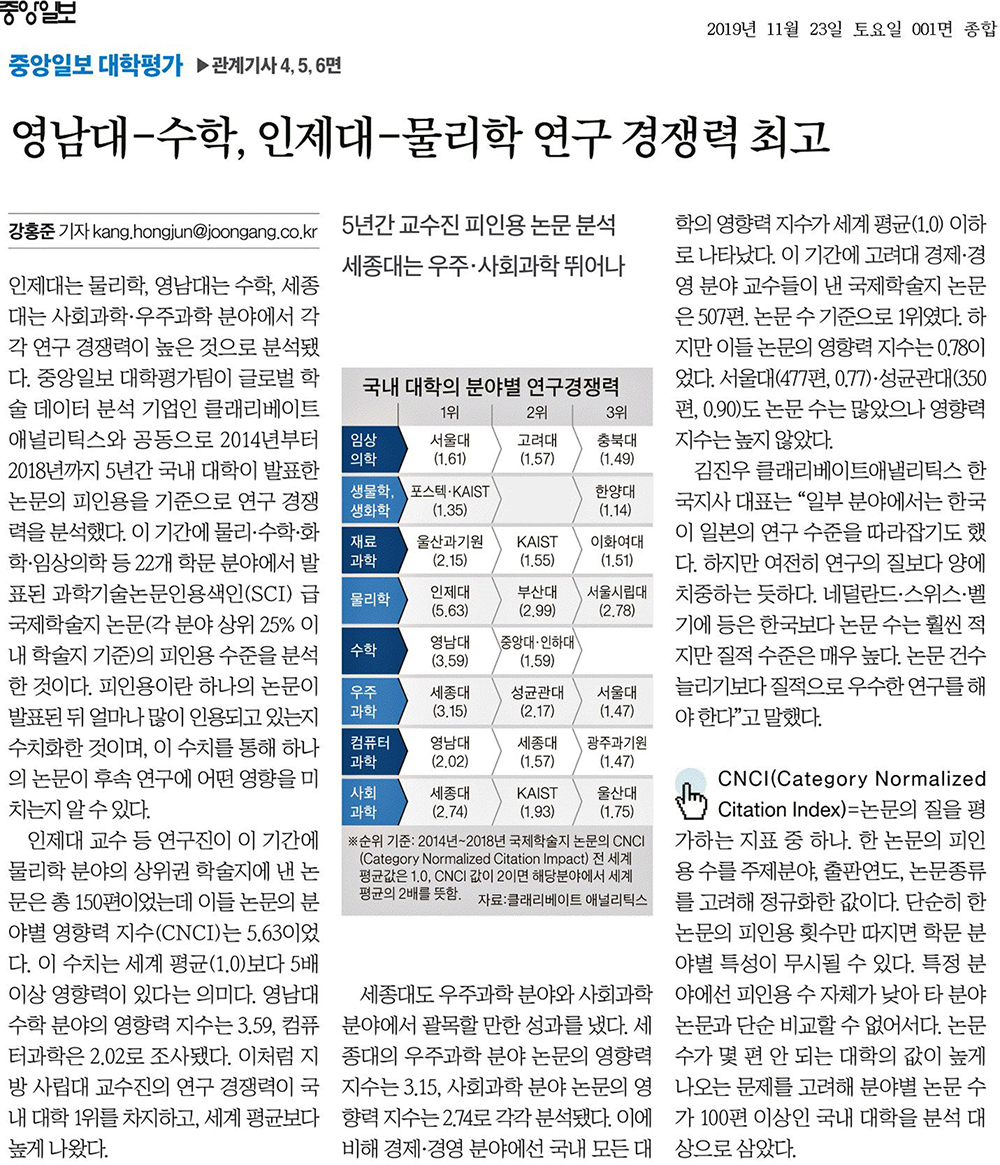YU Ranked First in Research Competitiveness in ‘Math and Computer Science’ N
No.89207- Writer pr
- Date : 2019.12.11 13:43
- Views : 8323
Of 8 academic fields, placed first in two fields such as math and computer science
[See original article] ▶ https://news.joins.com/article/23639742
[Journalist Kang Hong-joon] It was found that Inje University had high competitiveness in physics, YU in math, and Sejong University in social science and space science. The Joongang Ilbo university ranking team analyzed research competitiveness based on citations of theses published by domestic universities for five years from 2014 to 2018 together with the global academic data analysis company, Clarivate Analytics. During this period, the citations of theses in Science Citation Index (SCI) international academic journals (top 25% academic journals in their respective fields) announced in 22 academic fields such as physics, math, science and clinical medicine. Citations show how many times a thesis is cited after being published and this number can show the impact of a thesis on following studies.

The CEO of Clarivate Analytics Korea said, “In some areas, Korea caught up to Japan in research capacities. However, it seems like the focus is more on the quantity of research rather than quality. The Netherlands, Switzerland and Belgium have much fewer theses than Korea, but their qualitative levels are very high. The focus should be on conducting excellent research in terms of quality, rather than on increasing the number of theses.”
▶ CNCI (Category Normalized Citation Index)
An index for evaluating the quality of a thesis. The number of citations in a thesis is the regular value considering the theme, year of publication, and type of thesis. When only talking about the number of citations of a thesis, the characteristics of different academic sector may be overlooked. This is because in some fields, the total number of citations is low and therefore cannot be compared to theses in other fields. Considering the issue that the value of universities with only a few theses would be high, domestic universities with at least 100 theses were analyzed.
Sejong University also exhibited remarkable achievements in the space science and social science sectors. The impact of theses in Sejong University’s space science sector was found to be 3.15 and the impact factor of theses in social science was 2.74. Comparatively, the impact factor of all domestic universities in the economic and business sectors was found to be below the global average (1.0). During this period, professors of Korea University in the economics and business sectors published 507 theses in international academic journals, taking first place in the number of theses. However, the impact factor of these theses was 0.78. Seoul National University (477, 0.77) and Sungkyunkwan University (350, 0.90) also had many theses, but their impact factors were low.
The CEO of Clarivate Analytics Korea said, “In some areas, Korea caught up to Japan in research capacities. However, it seems like the focus is more on the quantity of research rather than quality. The Netherlands, Switzerland and Belgium have much fewer theses than Korea, but their qualitative levels are very high. The focus should be on conducting excellent research in terms of quality, rather than on increasing the number of theses.”
▶ CNCI (Category Normalized Citation Index)
An index for evaluating the quality of a thesis. The number of citations in a thesis is the regular value considering the theme, year of publication, and type of thesis. When only talking about the number of citations of a thesis, the characteristics of different academic sector may be overlooked. This is because in some fields, the total number of citations is low and therefore cannot be compared to theses in other fields. Considering the issue that the value of universities with only a few theses would be high, domestic universities with at least 100 theses were analyzed.
